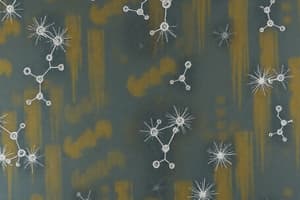Podcast
Questions and Answers
What makes carbon the linchpin of organic chemistry?
What makes carbon the linchpin of organic chemistry?
- Inability to form double or triple bonds
- Being the most abundant element in organic compounds
- High reactivity in all chemical reactions
- Ability to form strong covalent bonds with various elements (correct)
Which carbon-carbon bond generates functional groups in organic structures?
Which carbon-carbon bond generates functional groups in organic structures?
- No bond
- Triple bond
- Double bond (correct)
- Single bond
What are functional groups in organic chemistry?
What are functional groups in organic chemistry?
- Elements that can only form single bonds
- Groups of atoms that impart distinct properties to organic compounds (correct)
- Highly reactive atoms in organic structures
- Structural units found only in inorganic compounds
Which type of organic reaction involves the replacement of a leaving group with a nucleophile at a carbon atom?
Which type of organic reaction involves the replacement of a leaving group with a nucleophile at a carbon atom?
How do nucleophilic substitution reactions contribute to organic chemistry?
How do nucleophilic substitution reactions contribute to organic chemistry?
What is the role of nucleophiles in organic reactions?
What is the role of nucleophiles in organic reactions?
What is the core aspect of organic chemistry?
What is the core aspect of organic chemistry?
Which type of reactions introduce a substituent group onto the aromatic ring?
Which type of reactions introduce a substituent group onto the aromatic ring?
What is the role of organic compounds in agriculture?
What is the role of organic compounds in agriculture?
Which reaction involves the transfer of electrons between organic compounds and oxidizing or reducing agents?
Which reaction involves the transfer of electrons between organic compounds and oxidizing or reducing agents?
In drug development, what role does organic chemistry play?
In drug development, what role does organic chemistry play?
'Synthetic methods such as Grignard and Wittig reactions are fundamental to the synthesis of which compounds?'
'Synthetic methods such as Grignard and Wittig reactions are fundamental to the synthesis of which compounds?'
Flashcards are hidden until you start studying
Study Notes
Exploring the World of Organic Chemistry
Organic chemistry is a captivating field that delves into the molecules forming the building blocks of life. It's a discipline that studies the structure, properties, and reactions of organic compounds, which contain carbon and hydrogen atoms, often with other elements such as oxygen, nitrogen, and sulfur.
Carbon's Central Role
Carbon's unique ability to form strong covalent bonds with various elements makes it the linchpin of organic chemistry. The carbon atom's ability to form single, double, or triple bonds, and engage in resonance, helps shape the complex and diverse structures of organic compounds.
The Double Bond and Functional Groups
One of the most pivotal aspects of organic chemistry involves the carbon-carbon double bond (C=C). These double bonds are often found in the backbone of organic structures, generating functional groups. Functional groups are specific groups of atoms that impart distinct properties to organic compounds. Common functional groups include -OH, -NH2, -COOH, and -CH3.
Reactions in Organic Chemistry
Organic reactions provide a rich and fascinating tapestry of mechanisms that shape the field. Some of the most fundamental reactions in organic chemistry include:
-
Nucleophilic substitution reactions: These reactions involve the replacement of a leaving group (X-) with a nucleophile (Y-) at a carbon atom. Examples include SN1, SN2, and E1 and E2 mechanisms.
-
Electrophilic aromatic substitution reactions: These reactions introduce a substituent group (Y) onto the aromatic ring, breaking its planarity and restoring it by delocalizing electrons. The reactions typically involve electrophiles.
-
Oxidation and reduction reactions: These reactions involve the transfer of electrons between organic compounds and oxidizing or reducing agents. Examples include oxidation of alkenes to aldehydes or ketones, and reduction of carbonyl groups to alcohols.
Synthesis of Organic Compounds
A core aspect of organic chemistry lies in the synthesis of organic compounds. Synthesis involves the formation of new bonds and the breaking of old bonds in a specific sequence to produce a desired target molecule.
Synthetic methods such as the Friedel-Crafts acylation, Grignard and Wittig reactions, and the Diels-Alder reaction are fundamental to the synthesis of complex organic compounds.
Applications of Organic Chemistry
Organic chemistry has a wide array of practical applications. Some of these include:
-
Drug development: Organic chemistry plays a crucial role in the synthesis of pharmaceuticals, which are the backbone of modern medicine.
-
Materials science: Organic compounds are utilized in the creation of polymers, plastics, and other materials with unique properties.
-
Agriculture: Organic compounds serve as pesticides, herbicides, and fertilizers.
Conclusion
Organic chemistry offers a rich and diverse landscape of interconnected concepts that foster curiosity and delve into the fundamental structures and processes that underpin the vast world of life. As chemists continue to explore this domain, the potential for new discoveries and innovations remains unbounded, paving the way for a more profound understanding of the world around us.
Studying That Suits You
Use AI to generate personalized quizzes and flashcards to suit your learning preferences.



